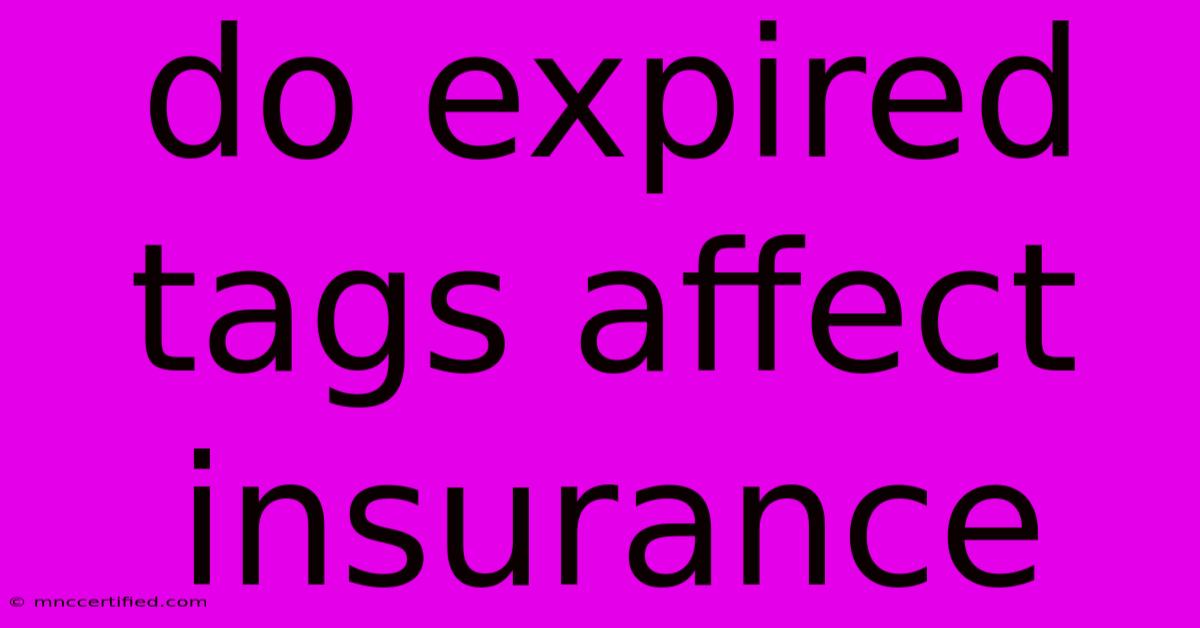Do Expired Tags Affect Insurance

Table of Contents
Do Expired Tags Affect Your Insurance? A Comprehensive Guide
Expired tags. Just the thought can send shivers down your spine. But beyond the potential fines and legal ramifications, a crucial question arises: do expired tags affect your insurance? The short answer is: it depends. This article will delve into the complexities of this issue, exploring various scenarios and offering valuable insights to protect your financial well-being.
The Impact of Expired Tags on Your Insurance Coverage
The effect of expired tags on your insurance coverage isn't a simple yes or no. It's nuanced and depends on several factors, including:
-
Your State's Laws: Each state has its own regulations regarding vehicle registration and insurance. Some states may have stricter penalties than others. Researching your state's specific laws is crucial.
-
Type of Insurance Claim: If you're involved in an accident with expired tags, the impact will vary depending on whether you're filing a claim for property damage, injuries, or liability.
-
Your Insurance Company's Policy: Individual insurance companies have their own internal policies regarding expired tags. Some might deny coverage completely, while others might offer partial coverage or apply surcharges. Review your policy documents carefully. It's often a good idea to contact your insurer directly if you have questions about your coverage with expired tags.
Scenario 1: Accident with Expired Tags
This is the most serious scenario. If you're involved in an accident with expired tags, your insurance company might:
- Deny your claim: This is a possibility, especially if the expired tags directly contributed to the accident (for example, if the lack of registration led to a lack of proper vehicle maintenance).
- Reduce your coverage: Your payout might be less than what you'd receive with valid tags.
- Increase your premiums: Expect significantly higher premiums after an accident with expired tags, reflecting the added risk you presented.
Scenario 2: No Accident, Just Expired Tags
Even without an accident, driving with expired tags can impact your insurance. Your insurance company might:
- Cancel your policy: While less likely than in the case of an accident, some insurers might cancel your policy if they discover you've been driving with expired tags for an extended period.
- Refuse to renew your policy: Renewal might be denied or offered at a much higher rate.
- Raise your premiums: Expect an increase in premiums even if no accident occurred.
Protecting Yourself: Preventing the Negative Impacts
The best way to avoid these negative consequences is to ensure your vehicle registration is always up-to-date. This means:
- Setting Reminders: Use calendar reminders, phone alerts, or even sticky notes to remind yourself of your registration renewal date.
- Paying on Time: Make timely payments to avoid late fees and potential penalties.
- Understanding Your State's Laws: Be aware of the specific regulations in your state regarding vehicle registration and insurance.
- Communicating with Your Insurance Company: If you have any concerns or questions, contact your insurance provider directly.
Key Takeaways: Expired Tags and Insurance
Driving with expired tags is a risky proposition. It not only exposes you to legal penalties but can also severely jeopardize your insurance coverage. Proactive management of your vehicle registration is crucial to maintain your insurance protection and avoid costly consequences. Remember that your specific situation and its impact on your insurance policy will depend on your state’s laws, your insurer’s policies, and the circumstances surrounding your expired tags. Always prioritize responsible driving and timely registration renewals to minimize any potential negative effects.
Disclaimer: This article provides general information and should not be considered legal or insurance advice. Always consult with your insurance provider and legal professional for specific guidance related to your circumstances.

Thank you for visiting our website wich cover about Do Expired Tags Affect Insurance. We hope the information provided has been useful to you. Feel free to contact us if you have any questions or need further assistance. See you next time and dont miss to bookmark.
Featured Posts
-
De Generes De Rossi Reported Us Departure
Nov 22, 2024
-
Arsenal Advances Hurtigs Late Winner
Nov 22, 2024
-
Nationwide Ground Beef Recall E Coli
Nov 22, 2024
-
Arsenal Vs Juventus Live Womens Cl
Nov 22, 2024
-
Storm Bert Amber Warning Transport Scotland
Nov 22, 2024